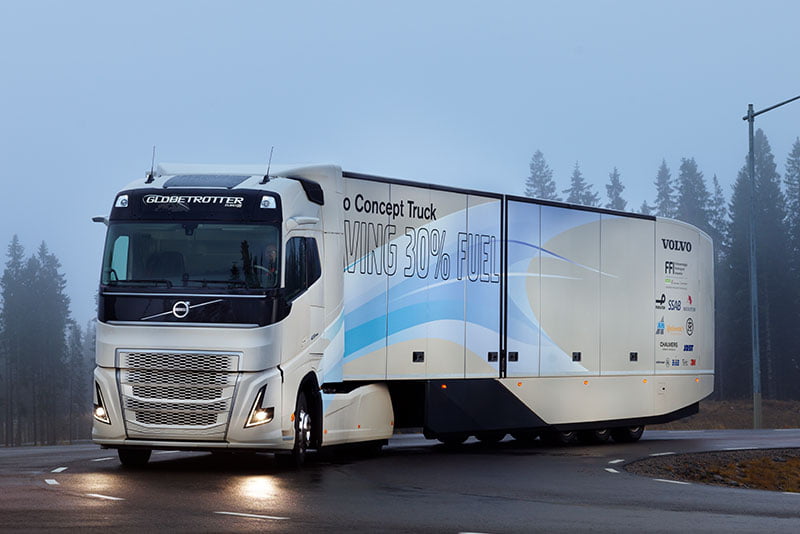Volvo Trucks has looked into the future of long-haul big rigs and sees a hybrid. The Swedish manufacturer, which owns the Mack brand in the U.S., is testing its first hybrid alternative powertrain truck to see how much fuel it will save on long-haul deliveries. The vehicle is expected to produce 30 percent less CO2 emissions than a comparable diesel powered traditional truck.
The hybrid is part of a growing movement within the trucking industry to design more fuel efficient and less polluting alternative powertrains. Other manufacturers are developing electric and hydrogen fuel-cell trucks.
“As society moves more and more towards renewable energy, we strongly believe that electromobility and hybrid technology will become increasingly important,” said Claes Nilsson, chief executive at Volvo Trucks. “With the concept truck, we will gain valuable knowledge and experience which will help us develop the technology further.”
When using Volvo Trucks’ new hybrid system, drivers should see fuel savings between 5 to 10 percent. The hybrid powertrain shuts off the combustion engine when it’s not needed, which amounts to about 30 percent of driving time.
A kinetic energy recovery system recaptures energy lost during braking or when driving downhill on a slope of more than one percent. The energy is then stored in the hybrid’s batteries until needed for flat roads or low gradient driving.
The new hybrid powertrain uses Volvo Trucks’ I-See program, taking data from GPS and electronic maps to analyze the driving topography and ensure the most efficient combination of power is used.
“We strive to be at the forefront of electromobility and to constantly push the limits when it comes to reducing fuel consumption and emissions,” Nilsson said. “The powertrain in our concept truck has been developed to improve transport efficiency and thereby help the industry towards sustainable transport.”
The hybrid, or Volvo Concept Truck, is the result of the Swedish part of a bilateral research project involving both the Swedish energy authority Energimyndigheten and the U.S. Department of Energy.
Other truck makers are jumping into alternative powertrains.
Last month, Mercedes-Benz said it was starting testing of a series of electric trucks for the delivery of goods in urban areas. It will have a range of about 125 miles.
“We are currently talking to around 20 potential customers from the disposal, foodstuffs and logistics sector,” said Stefan Buchner, head of Mercedes-Benz Trucks worldwide. “By 2020 we want to be on the market with the series generation.”
Buchner said the truck will initially go to customers in Germany – and later elsewhere Europe too.
“It will be used in real transportation applications there,” he said. “The aim is to use actual application scenarios and requirement profiles together with the customer to further optimize the vehicle concept and the system configurations of the electric truck.”
Elsewhere, Salt Lake City startup Nikola Motor Co. is developing a hydrogen fuel cell long-haul truck.
Nikola is developing the Nikola One, a zero-emission, hydrogen-powered electric truck boasting a range of 800 to 1,200 miles while carrying a full load of 65,000 pounds without stopping at a hydrogen fueling station. The hydrogen-electric hybrid truck will use a 300kW fuel cell as well as a 320kWh battery bank that will provide backup energy and help the truck with high-torque situations and hill climbing.
Last year, Toyota Motor Corp., said it was considering developing is own a heavy-duty fuel cell truck. The Japanese automaker has formed a special team within Toyota’s U.S.-based research and development unit to work on a fuel cell electric powertrain for use in a heavy-duty, or Class 8 truck. It already is building hydrogen fuel cell buses and forklifts, as well as the Mirai passenger sedan.



